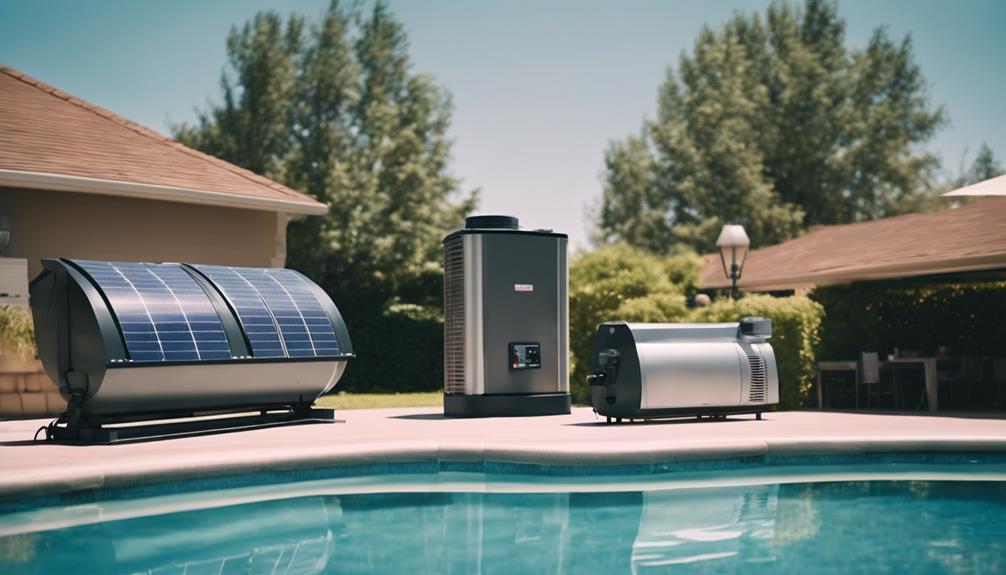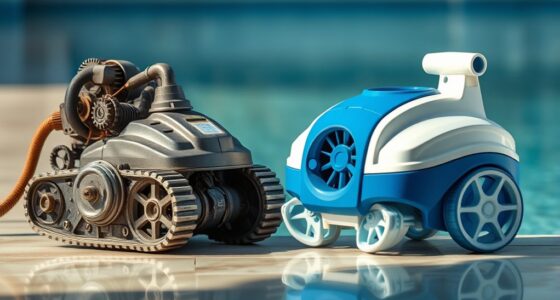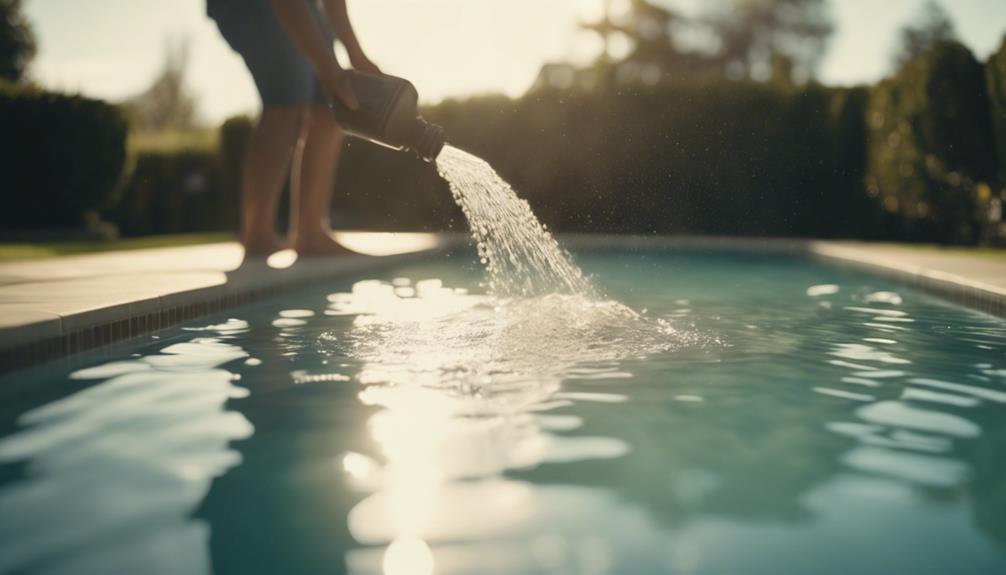Public swimming pools are emptied based on their usage, environmental considerations, and water quality regulations. By monitoring these factors, pool managers determine when it is necessary to refill the pool. This process is essential for maintaining a clean and safe swimming environment. Factors such as water testing, cleanliness, and pool size influence how frequently this maintenance task is performed. The next time you visit the pool, take a moment to acknowledge the hard work that goes into keeping the water pristine and ready for swimmers. Learn more about interesting pool facts here.
Key Takeaways
- Draining frequency varies based on usage levels and environmental conditions.
- Water quality standards influence draining schedules for public pools.
- Regular maintenance prevents the need for frequent draining.
- Larger pools may require less frequent draining compared to smaller pools.
- Signs like algae growth or foul odors indicate a need for draining.
Factors Influencing Draining Frequency
Factors that influence the frequency of draining public swimming pools include usage levels, environmental conditions, and water quality standards. Let's delve into the details of maintenance schedules and water quality.
Public pools see a lot of activity – from kids splashing around to adults lounging in the sun. All this fun means more contaminants like sweat, sunscreen, and even urine (yuck!) entering the water. That's where water quality comes into play. To maintain safe and clean swimming conditions, pool managers need to keep a close eye on chemicals and bacteria levels.
A strict maintenance schedule helps in filtering out impurities and balancing the pool's chemistry. The better they manage these factors, the longer they can go between drainings. It's like giving your pool a spa day to refresh and renew its sparkle! Remember, a well-maintained pool isn't just about looking good; it's about keeping swimmers healthy and happy.
Importance of Water Quality Standards
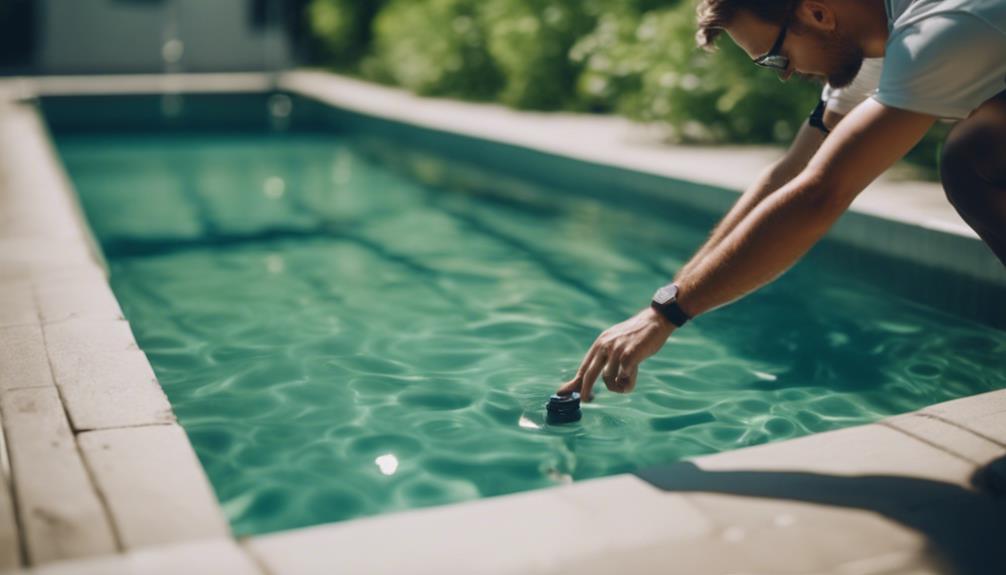
When it comes to public swimming pools, water quality standards are super important. These regulations guarantee that the water you splash around in is safe and clean.
Water Quality Regulations
Adhering to strict water quality regulations for public swimming pools is essential to guarantee the safety and health of swimmers. These rules aren't just there for show; they're in place to make sure that you can enjoy a dip in the pool without worrying about any nasty surprises lurking in the water.
Health departments mandate that pool water must be regularly tested to maintain proper pH levels, chlorine levels, and bacteria counts. If these standards aren't met, fines, closures, or other penalties could be on the horizon.
Imagine diving into a pool full of murky water – not a pleasant thought, right? That's why keeping chlorine levels in check is vital; it's like having a superhero that fights off germs and keeps the water clean and safe for everyone.
Monitoring and Compliance
Regularly monitoring water quality and ensuring compliance with established standards at public swimming pools is vital to safeguarding the health and safety of swimmers.
When it comes to keeping the water in public pools safe to swim in, it's not just about having a clean pool but also about making sure the water quality meets the set guidelines. This means that health departments require public pools to regularly test the chlorine levels, pH balance, and other chemical parameters to make certain everything is in check.
These tests are important for maintaining the water quality standards that are in place to protect swimmers from harmful bacteria and germs.
Health departments also conduct inspections to ensure that public pools are meeting the necessary requirements. Remember, failure to comply with these water quality standards can lead to fines, closure of the pool, or other enforcement actions, so it's crucial to stay on top of monitoring and compliance to keep the pool safe and enjoyable for everyone.
Health and Safety
Maintaining water quality standards is vital for the health and safety of swimmers in public pools. When it comes to pool maintenance, keeping the water clean and safe is a top priority. Health departments set guidelines on how often pools need to change their water to prevent any icky stuff from spreading. Imagine swimming in a pool where the water isn't properly taken care of—yikes! That's why following these water quality standards is essential.
Contaminant Removal Through Draining
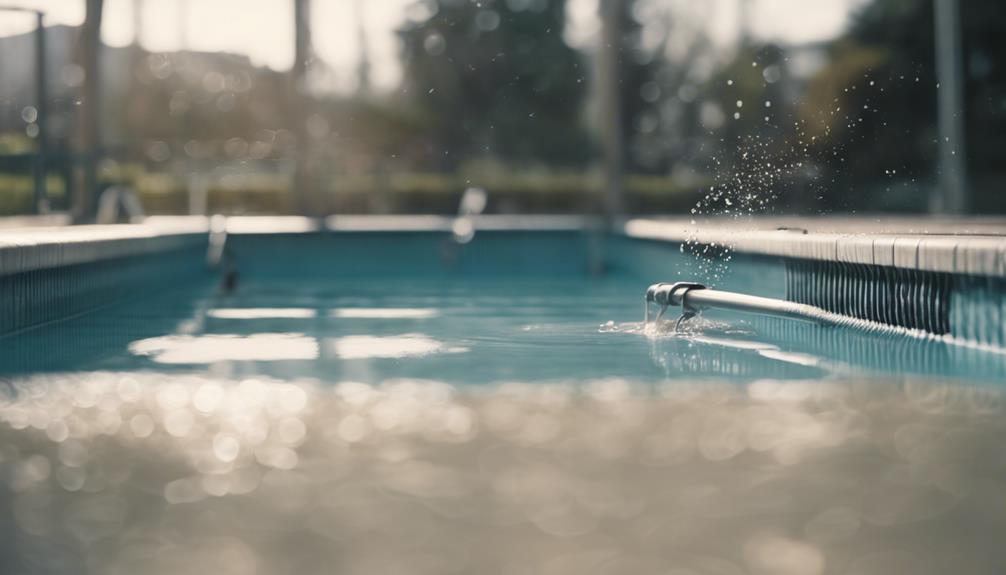
To effectively remove contaminants from public swimming pools, draining is an important maintenance practice that guarantees water quality and hygiene. When pools get all gunked up with stuff like bacteria, algae spores, body oils, sweat, and other gross things, draining them helps to clean out all that yucky stuff and keep the water nice and clear for everyone to enjoy.
Here are some key points to remember about contaminant removal through draining:
- Draining a pool eliminates harmful bacteria and organic materials that can make the water dirty and unsafe.
- Factors like how often the pool is used and the quality standards set by health departments influence how frequently a pool needs to be drained.
- Regular draining is essential to prevent the buildup of dissolved solids, minerals, and chemical byproducts that can mess with the water's safety.
- By maintaining pools properly and draining them periodically, we can stop the spread of illnesses and make sure swimmers have a clean and fun experience.
Benefits of Regular Pool Maintenance
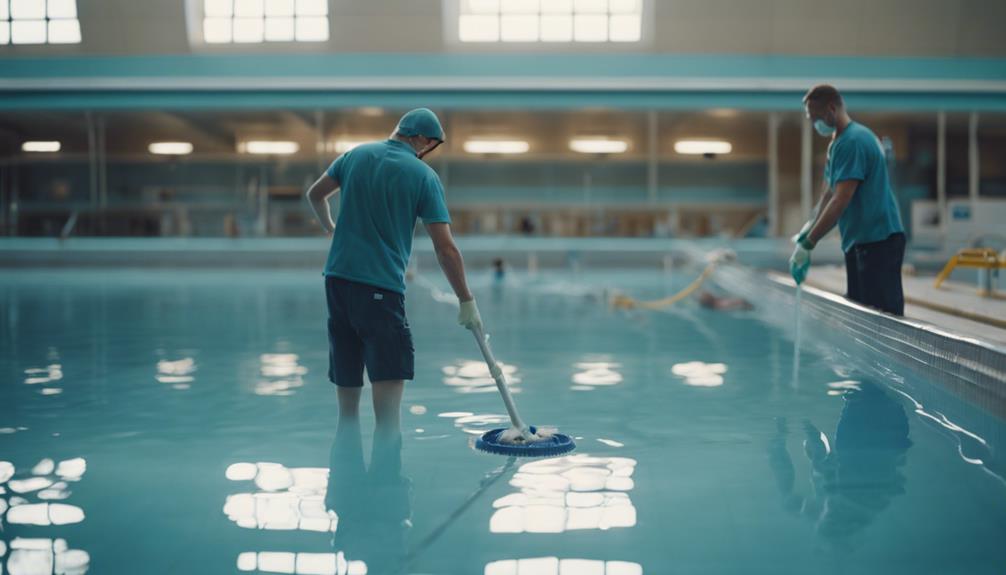
Let's talk about why regular pool maintenance is super important.
Keeping up with cleaning and maintenance not only helps in preventing waterborne illnesses but also guarantees that your pool water stays clear and safe for swimming.
Importance of Cleaning
Regular cleaning and maintenance of public swimming pools play an essential role in ensuring a safe and enjoyable swimming experience for all. When it comes to pool cleaning, keeping the water clear and free from contaminants is important.
Here are some benefits of regular pool maintenance:
- Preventing Waterborne Illnesses: Proper cleaning practices help reduce the risk of illnesses caused by harmful bacteria in the water.
- Maintaining Water Clarity: Regular cleaning routines like skimming and vacuuming prevent the water from becoming cloudy or contaminated.
- Preventing Algae Growth: Essential tasks like filter cleaning play a significant role in stopping algae from taking over your pool.
- Balancing pH Levels: Checking and adjusting chlorine and pH levels regularly is critical for proper disinfection and water balance.
Preventing Waterborne Illnesses
Proper maintenance of public swimming pools, particularly in monitoring and adjusting chemical balances, is essential for preventing waterborne illnesses and guaranteeing a safe swimming environment. When it comes to keeping swimmers healthy, chlorine plays a vital role. This chemical helps kill bacteria and other harmful germs lurking in the water. Imagine it as a shield protecting you from getting sick while you enjoy your swim.
| Benefits of Proper Pool Maintenance | How it Helps |
|---|---|
| Regular Chlorine Levels | Kills Germs |
| Changing the Water Regularly | Removes Contaminants |
| Monitoring pH Levels | Ensures Safe Water |
| Routine Cleaning and Disinfection | Reduces Illness Risks |
Impact of Pool Size on Draining

The impact of pool size on draining frequency is directly tied to the efficiency of contaminant dilution and water quality maintenance. When it comes to maintaining public swimming pools, the size of the pool plays an essential role in determining how often it needs to be drained. Here are some key points to take into account:
- Larger pools generally require less frequent draining due to their higher water volume, which helps dilute contaminants effectively.
- Smaller pools, on the other hand, may need more frequent draining to keep the water quality at a favorable level.
- The amount of contaminants present in the pool is influenced by its size, affecting the frequency of draining needed for maintenance.
- The correlation between pool size and draining frequency highlights the importance of proper water management to guarantee a safe and clean swimming environment for everyone to enjoy.
Frequency Variations in Draining Practices
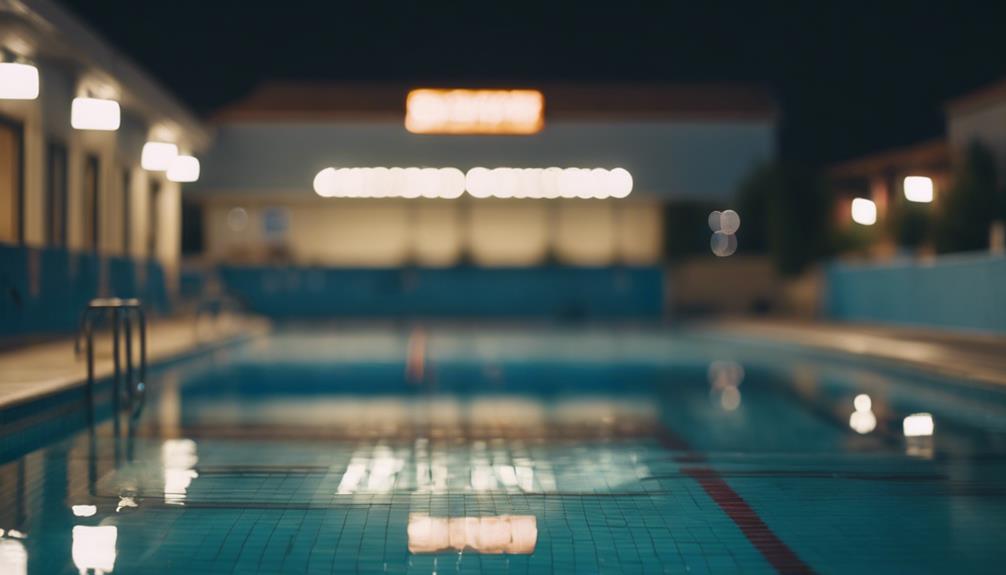
Draining practices for public swimming pools exhibit significant variations influenced by factors such as pool usage, environmental conditions, and water quality maintenance.
The frequency of draining can differ from pool to pool based on how much it's used, the surrounding environment, and how well the water quality is kept in check. Think about it like this: if a pool is constantly bustling with swimmers, it might need more frequent draining compared to a quieter pool.
Plus, things like regular cleaning, filtration, and making sure the chemicals are just right can impact how often a pool needs to be drained.
Health departments also keep a close eye on public pool water quality. If tests show any potential hazards, they might recommend a good ol' draining session to keep everyone safe and splashing happily.
Ensuring Safety Through Draining
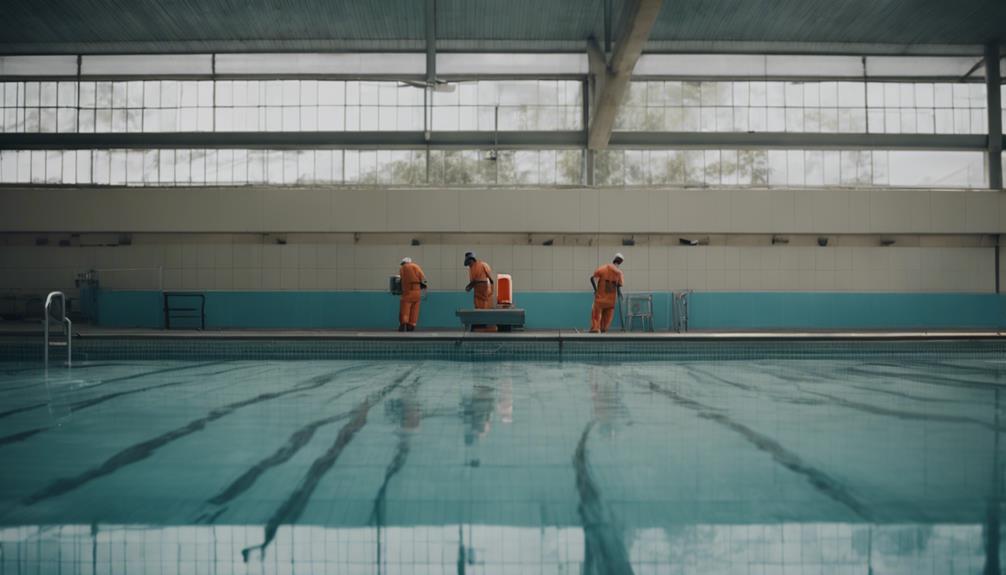
To maintain a safe and clean swimming environment, ensuring proper drainage practices in public pools is essential. When it comes to draining, there are a few key things to keep in mind:
- Regular Maintenance: Draining your pool once or twice a year helps keep the water quality excellent, preventing any nasty surprises.
- Contaminant Control: By draining regularly, you can say goodbye to unwanted guests like bacteria and algae, ensuring a rejuvenating swim every time.
- Chemical Balance: Proper draining also allows for a reset in chemical levels, helping to maintain that crystal-clear water you love to splash around in.
- Safety First: Remember, draining isn't just about cleanliness; it's about creating a safe space for everyone to enjoy. So, don't skip this important step in pool maintenance!
Signs Indicating the Need for Draining
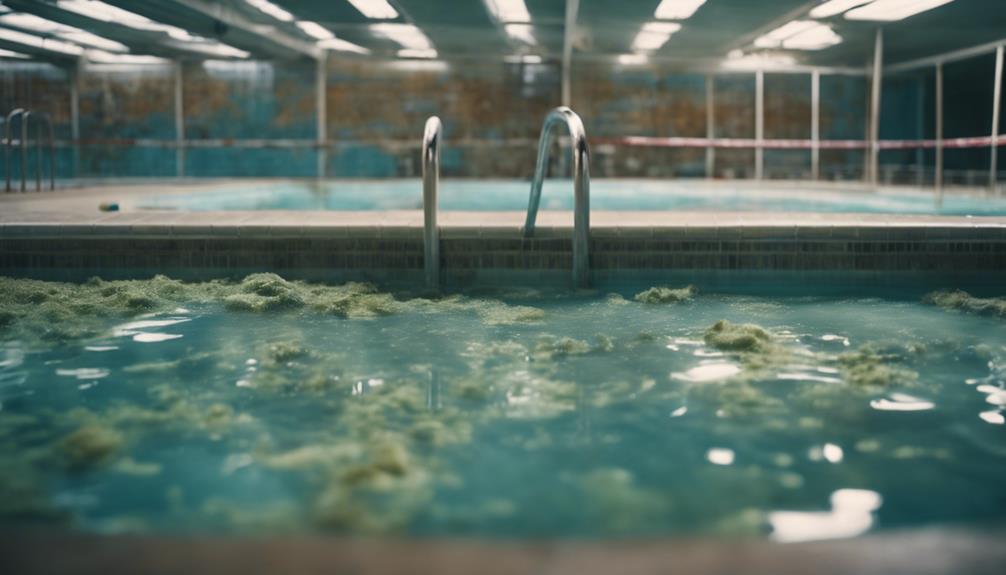
Ever noticed your pool looking a bit slimy, with water turning a funky shade of green? Or maybe caught a whiff of some not-so-pleasant odors lingering around the pool area? These signs might be telling you it's time to contemplate draining the water and giving your pool some much-needed TLC to guarantee crystal-clear, safe swimming conditions.
Keeping an eye out for water quality concerns, prioritizing health and safety, and staying on top of maintenance requirements are all key aspects to ponder when deciding if your pool needs a fresh start.
Water Quality Concerns
Signs indicating the need for draining public swimming pools due to water quality concerns can include cloudy or murky water, foul odors, algae growth, excessive mineral buildup, and health department intervention.
If you see any of these signs in a pool, it might be time for a water change to keep things clean and safe for swimmers.
- Cloudy or murky water: This could mean there are too many particles floating around, affecting the water quality.
- Foul odors: Unusual smells in the pool water might be a sign of contamination buildup, which isn't ideal for an invigorating swim.
- Algae growth: If you spot slimy green patches, it's time to act fast to prevent further spreading of algae.
- Excessive mineral buildup: Crusty deposits or scaling on pool surfaces indicate hard water issues that need addressing for better water quality.
Health and Safety
If you notice cloudy or murky water, unpleasant odors, excessive foam, visible algae growth, or unsafe bacteria levels in a public swimming pool, these are clear signs indicating the need for draining to maintain health and safety standards.
When the pool water looks more like pea soup than crystal clear blue, it's time for a change. No one wants to swim in a pool that smells like a science experiment gone wrong or is so foamy you feel like you're in a giant bubble bath. Algae shouldn't be part of the pool party either – if you can see it creeping around, it's a definite sign that something needs to be done.
Moreover, if the water tests show bacteria levels that are off the charts, it's a red flag that the pool water isn't safe for a dip. Even finding unexpected items like debris or heaven forbid, a critter, in the pool means it's time to say goodbye to the old water and hello to a fresh refill.
Maintenance Requirements
Regular monitoring and testing of water quality in public swimming pools helps maintenance crews determine when draining is necessary. When it comes to keeping those pools crystal clear and safe for your splashing adventures, there are a few signs that indicate it's time for a good ol' drain and refill session:
- Slimy walls: If the walls of the pool feel slimy to the touch, it's a big red flag that things aren't as they should be.
- Green water: Unless it's St. Patrick's Day, green water is a telltale sign of algae overgrowth that needs serious attention.
- Foul odors: If your nostrils are greeted by unpleasant smells when you approach the pool, it's time to contemplate hitting the drain button.
- Persistent cloudiness: A cloudy pool isn't just mysterious; it's a sign that the water quality might be off-kilter.
Professional Assistance for Draining

Seeking professional assistance when draining a public swimming pool is crucial to avoid costly mistakes and guarantee the process is done correctly. When it comes to draining operations, it's best not to take any chances.
Costly repairs might be needed if things go south, so having experts like Deep End Pools on your side can save you a lot of trouble. These professionals can provide expert guidance and services to make sure that the draining process is smooth sailing. They can also help you figure out how often your pool needs draining to keep it in top shape.
Trust me, it's not something you want to mess up – the structure of your pool could be at risk! Let the pros handle it, and you can relax knowing that your pool is in good hands. Remember, when it comes to draining operations, leave it to the experts!
Common Misconceptions About Pool Draining
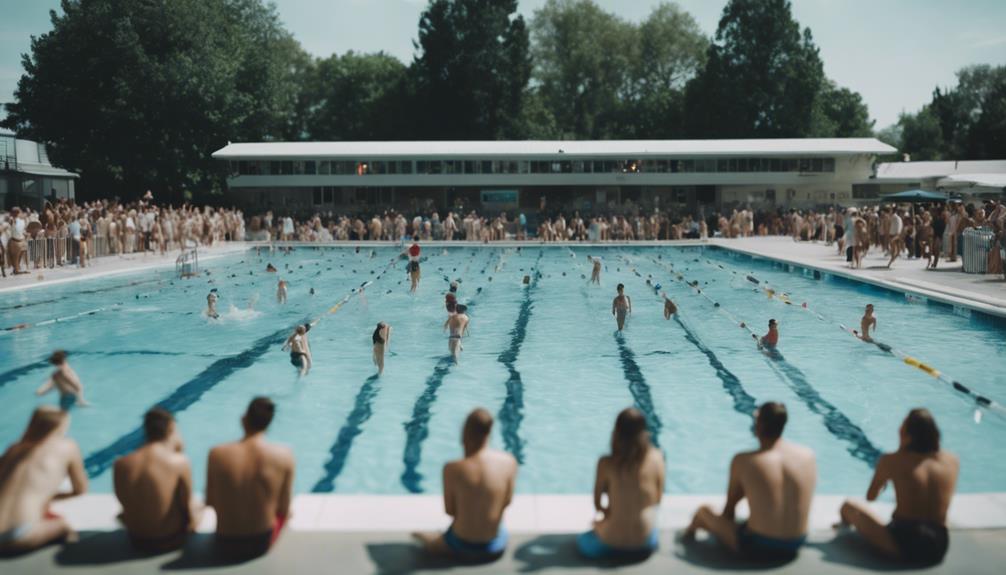
Despite common beliefs, public swimming pools aren't typically drained daily or weekly as many people think. There are some common misconceptions about pool draining that might surprise you:
- Water should be changed: While public pools don't need to be drained frequently, the water should still be changed periodically to maintain water quality and clarity.
- Filtration system: Public pools rely heavily on their filtration systems to keep the water clean and safe. These systems work continuously to remove debris and contaminants, reducing the need for frequent draining.
- Chemical levels: Regular checks of chemical levels, especially chlorine, help ensure that the water remains sanitized and safe for swimmers without the need for constant draining.
- Different maintenance for indoor and outdoor pools: Indoor and outdoor pools have unique maintenance requirements. Indoor pools may require more ventilation and dehumidification, while outdoor pools may need extra attention to handle external factors like weather and debris.
Understanding these facts can help debunk misconceptions about pool draining and highlight the importance of proper maintenance practices in keeping public swimming pools clean and safe for everyone to enjoy.
Frequently Asked Questions
How Often Should a Public Pool Be Drained?
When it comes to public pools, the timing for draining can vary. Factors like pool use, weather, and local rules all play a part.
Regular checks and good filtration keep the water clean longer. With the right balance of chemicals and modern systems, you mightn't need to drain as often.
Health officials watch for any issues and might call for a pool refresh if needed.
Just keep splashing safely!
How Often Do They Empty Swimming Pools?
So, how often do they empty swimming pools?
Well, public pools aren't drained daily or weekly. Maintenance crews work hard to keep them clean without draining them constantly. They use robots or clean overnight to maintain water quality.
The chlorine levels are checked twice a day to make sure the water is safe. Different types of pools, indoor or outdoor, have specific maintenance needs to keep swimmers safe and happy.
How Often Do Swimming Pools Change the Water?
So, about changing the water in public swimming pools, let's clarify things. Public pools don't get drained as often as you might think. Maintenance crews work hard to keep the water clean using chemicals and automated cleaners regularly.
The water quality is monitored multiple times a day, especially the chlorine levels. So, no need to worry, the pools are well looked after to guarantee a safe and enjoyable swim for everyone!
How Often Does a Pool Lose Water?
So, let's chat about how often a pool loses water. Pools actually lose water every day due to evaporation, splashing, and cleaning. The amount can change depending on factors like weather and how much the pool is used.
Keeping an eye on the water level and topping it off can help balance things out. Draining pools isn't usually needed unless there's some big maintenance or fixing to do.
Just a little pool wisdom for you!
Is Draining the Pool Necessary for Proper Cleaning?
Draining the pool for proper cleaning your pool frequency suggested is not necessary. Regular maintenance and proper chemical balance can keep your pool clean without the need for draining. Weekly skimming, vacuuming, and scrubbing the walls can ensure a clean and inviting pool for your enjoyment.
Conclusion
So, next time you think your public pool is due for a draining, remember that it's not just a once in a blue moon kind of thing. Keeping that water clean and safe for everyone to enjoy is a top priority.
So, don't wait until your pool is practically a science experiment – stay on top of those maintenance tasks and keep swimming in crystal clear water!


